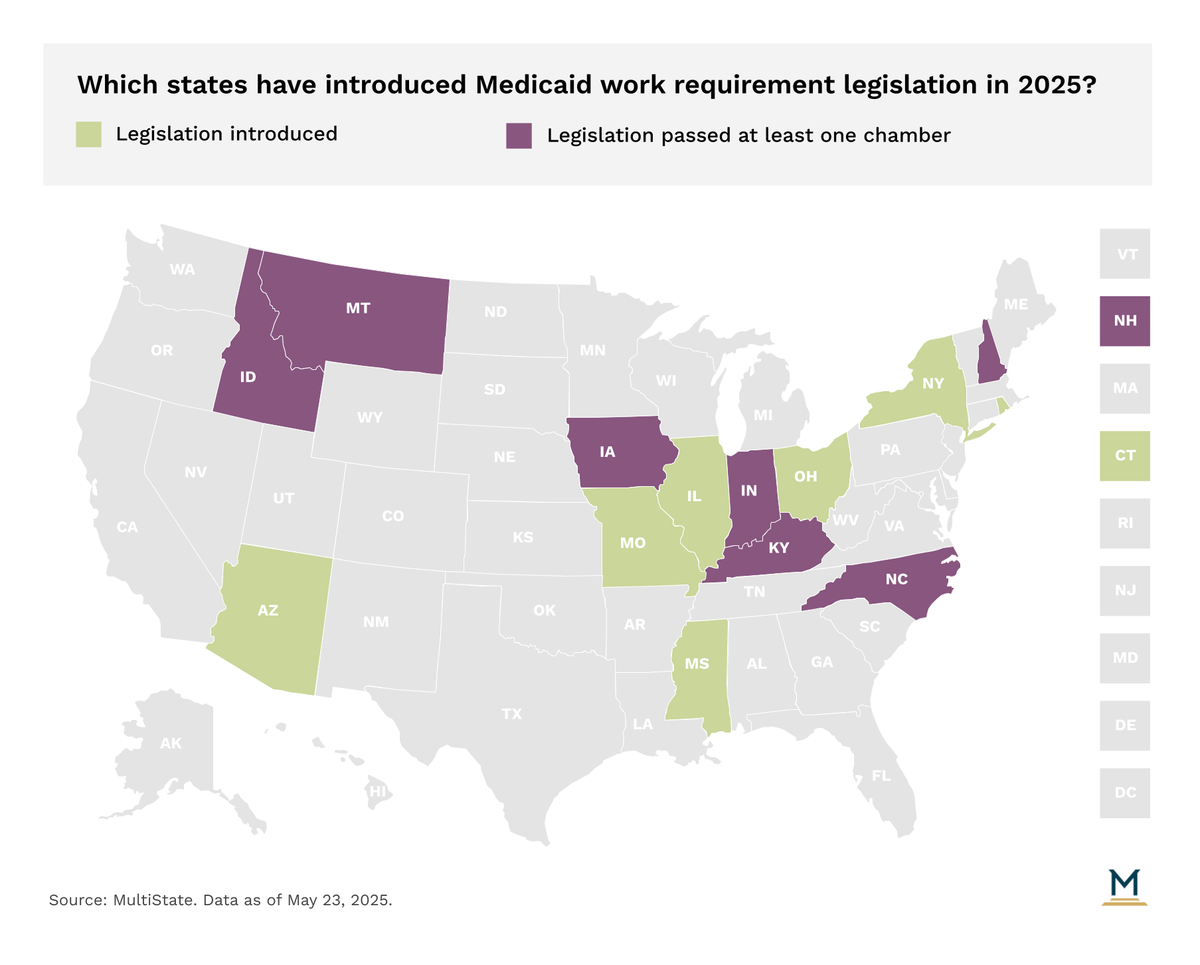
Health Care & Wellness
Alcohol Legislation Takes A New Turn: Canned Cocktails, Direct-to-Consumer Shipping, and More
February 12, 2026 | Kerrie Zabala
June 17, 2025 | Lisa Kimbrough

Key Takeaways:
As revenue pressures force states into delicate budget decisions and Congress looks to implement President Trump’s first-term agenda, an obvious place to look is one of the largest budget items for all jurisdictions: Medicaid. While actual cuts to services and population are not overly popular with voters, the addition of work or community engagement requirements for recipients has been a perennial (though so far unsuccessful), option for budget conscious legislators. With the Trump administration supportive of such measures, states and Congress feel the time is right for action.
As passed by the U.S. House of Representatives this week, the budget reconciliation bill, HR 1, contained a provision requiring states to implement work or community engagement requirements (80 hours per month of either employment, community service, work program, education or a combination of any of those) as a condition of eligibility for the Medicaid expansion population. In the original bill, these requirements were to take effect January 1, 2029. The Republican leadership believed this would give states some runway to start this program. Fiscal conservatives within the party pushed back and argued that mandating work and community engagement requirements will save billions of dollars and should begin as soon as possible. The final version adopted by the House of Representatives brought the implementation date forward to December 31, 2026. However, the bill also authorizes states to implement work or community engagement requirements earlier if they so choose.
The bill still has to work its way through the Senate where it faces opposition from both parties. A handful of Republican Senators have expressed unhappiness with some of the other changes made to Medicaid; enough to scuttle the bill in its current form, though the work and community engagement requirement is likely to stay. A floor vote is not expected in the next week.
So far In 2025, 27 bills in 14 states have been introduced that would require some community engagement in order to receive Medicaid benefits. Idaho HB 345, Indiana SB 2, Kentucky HB 695 and Montana HB 687 have been enacted. Those bills in Idaho, Indiana, and Montana passed with overwhelming majorities in both chambers. In Kentucky, the bill was vetoed by Governor Beshear (D) but was overridden by the legislature.
Of the other states that have pending legislation to add work requirements to beneficiary eligibility, only Arizona, Connecticut, Iowa, New York, and North Carolina are still viable. The bills in Arizona, Connecticut, and New York have either not had a hearing or have been stuck in their originating chambers for months. The bills in Iowa and North Carolina seem likely to pass. In North Carolina, work and community engagement requirements are in the Appropriations Act, so the Democratic governor Josh Stein will be hard pressed to veto the bill (he does not have line item veto power), though he has been vocally critical of such requirements. Conversely, Iowa governor Kim Reynolds is leading Iowa’s efforts to get federal approval for an 1115 waiver to add work and community engagement requirements. She will likely endorse the bill headed her way, which will enshrine work requirements in statute.

Arizona, Arkansas, Iowa, and Ohio have already submitted 1115 waivers to add work requirements to their Medicaid plans; Georgia has applied to have its work requirement program (the only one currently in effect) renewed. No timeline has yet been indicated by the administration for when those may be approved. However, they are expected to be approved well before the work and community engagement requirements mandated by the reconciliation bill take effect. Following enactment of federal requirements for work and community engagement, states may try to adopt programs that exceed these requirements. It is unclear if programs that attempt to amend the requirements to more than 80 hours per month of approved activities, or removal of some of the exceptions for pregnant participants or students, for example, would be required to file waivers and how the administration would welcome those.
The ever-evolving state health policy landscape will continue to influence how health care organizations make business decisions. MultiState’s team pulls from decades of expertise to help you effectively navigate and engage. MultiState’s team understands the issues, knows the key players and organizations, and we harness that expertise to help our clients effectively navigate and engage on their policy priorities. We offer customized strategic solutions to help you develop and execute a proactive multistate agenda focused on your company’s goals. Learn more about our Health Care Policy Practice.

February 12, 2026 | Kerrie Zabala

February 5, 2026 | Geoff Hawkins

January 27, 2026 | Lisa Kimbrough